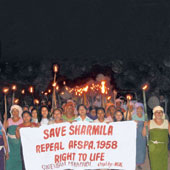 |
| Dark Act: A torchlight procession in Imphal demands the repeal of the AFSPA |
On July 11, 2004, 32-year-old Thangjam Manorama Devi was picked up in the dead of night from her family residence in Imphal, Manipur, by a team from the 17 Assam Rifles on charges of having links with the outlawed northeast terror group People's Liberation Army. Her bullet-riddled body was discovered four kilometres away the next morning. And while the army had their reasons for arresting her, civilians believed that it went too far, thanks to the degree of immunity that it enjoyed under the Armed Forces (Special Powers) Act (AFSPA). All hell subsequently broke loose; people took to the streets and public criticism mounted against the Act. It was felt that the Act was opposed to the human and fundamental rights of Indian citizens.
More than two years have gone by, but controversy over the AFSPA still rages. And the comments by Prime Minister Manmohan Singh, followed closely by those of defence minister A.K. Antony earlier this month, only cement the government’s position on the law. The Act must stay, says the government, though efforts will be made to amend it in order to make it “more humane”.
A lot of water has flowed under the bridge since the Manorama incident turned the heat on the AFSPA. In November 2004, a committee headed by retired Supreme Court judge B.P. Jeevan Reddy was constituted to look into the issue and suggest whether the Act needed amending or repealing. The committee submitted its report after its six-month tenure. The report, along with its recommendations, however, was never tabled, and was only subsequently leaked to the media through sources.
Going by what became public, the report recommended the repealing of the AFSPA. But with the powers-that-be now indicating that repealing the Act is not on the cards, frustration abounds among those lobbying for its annulment.
“In the past, the government was buying time by first waiting for the report and then delaying its tabling,” says Babloo Loitongbam, of the Imphal-based organisation Human Rights Alert. “And now, by saying that it would only amend the Act, the government has made its stance clear with respect to a law which symbolises oppression. It is an unfortunate and regressive development.”
The AFSPA was enforced way back in 1958 when violence was becoming a way of life in the northeast and the state governments were failing to contain internal disturbances. Initially legislated for Assam and Manipur, the Act was soon extended to cover the seven hill states of northeast India.
Under the Act, armed forces personnel posted in the states — including commissioned, warrant and non-commissioned officers — are given the power “to fire upon or otherwise use force, even to the causing of death, against any person who is acting in contravention of any law and order”, if they are of the opinion that it is necessary to do so for the maintenance of public order. Besides, the Act empowers personnel to arrest — without warrant — people suspected of committing or being prone to commit a crime, and enter and search without warrant any premises to make such arrests.
Clearly, the law grants unlimited powers to army personnel operating in the volatile sectors of northeast India. And its possible misuse is what gives the AFSPA a draconian tag in human rights circles. In the past, public hatred for the legislation has often led to protests, some as drastic as the years-long hunger strike staged by Irom Sharmila, who was often force-fed by the police.
The army, for the time being, remains silent on the subject. “The defence minister’s word on this issue is final, and since he has spoken already, the army now has nothing more to say,” says an army spokesperson.
That will not keep human rights activists quiet, though. “The Act is not being done away with simply because the forces don’t want it to go,” says Y.P. Chibbar, general secretary, People’s Union for Civil Liberties. “And if the government says it will stay, it’s perhaps because it is buckling under enormous pressure from the forces.”
Says Colin Gonsalves, executive director of the Delhi-based Human Rights Law Network, agrees. “The government has perhaps got used to the statute over the years, and now lacks the courage to go against army pressure,” he says. “And it’s easy for the army to blackmail it by saying that repealing the Act might lead to terrorism.”
Nevertheless, the army may have its own reasons to favour the staying of the Act. Gen. V.P. Malik, former chief of the Army staff who served in the northeast in the early Nineties, offers his views on the subject. “Of course, soldiers cannot fire indiscriminately on civilians, and the army has its own code to deal with such cases which have happened in the past,” he justifies. “But in areas where it is necessary for the army to retaliate against miscreants, it is an imperative for the forces to have some kind of a legal cover. If the police can be covered by law, why not the army? It is just not possible to fight without being given the right to open fire.”
Malik fears that if the law is repealed, a time would come when junior officers would disobey orders from their commanding officers to go into encounters. “I am all for modifications or amendments, but the AFSPA should stay,” he says.
Ultimately, it’s perhaps a middle-path that needs to be trod. For if the army is right in saying that it is difficult to fight with both hands tied behind its back, human rights activists too are right in their concern that innocent people are falling prey to bullets because the army misuses the Act. Naturally, it is up to the government to take the final call.










